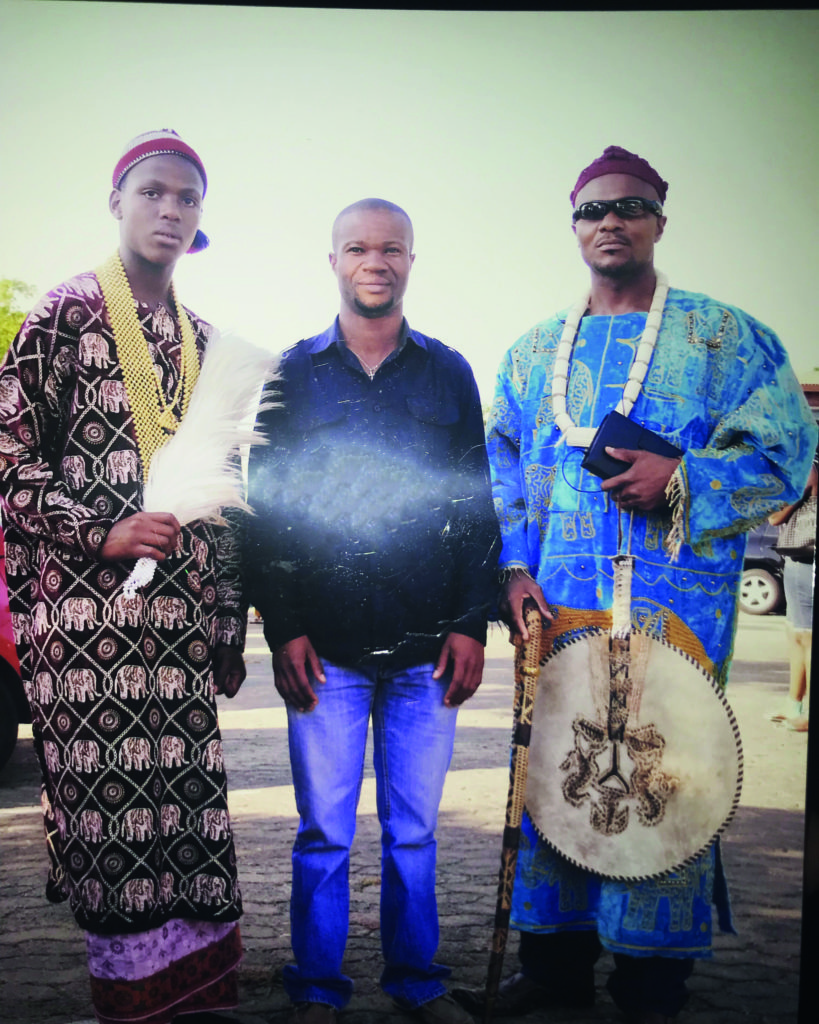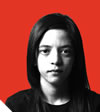Hacjivah Dayimani had to defy his father to pursue his rugby dream, writes MARIETTE ADAMS.
Hacjivah Dayimani went through three provinces, five schools and countless hardships before making it big at the Lions. He also had to show some disregard for authoritarian decisions.
Dayimani’s wide-ranging skill set was on show for the Golden Lions against the Blue Bulls in September when he scored a brace of tries and made a defining turnover on the tryline in the dying seconds of the game.
Based on that performance, Dayimani seemed fated to fulfil his potential. But an unorthodox family dynamic and unique upbringing meant he had to endure and overcome challenges far beyond simply trying to make it big as a rugby player.
Born in Cape Town, Dayimani is the son of Lushabowang, a Xhosa woman who practises as a sangoma and works as a domestic, and the late Frank Times Ifeanyichukwu, a Sabbath-observing Igbo Jew, former boxer, businessman and author with strong political ties in South Africa and his native Nigeria. Hacjivah is a combination of the Hebrew name ‘Akiva’, which means ‘to protect’, and the Xhosa name ‘Mpumelelo’, which translates to ‘achiever’.
Dayimani admits that while his parents compromised in settling on his name, that was where it had ended. Along with two older siblings, he was raised by his mother in the Milnerton area. His brother, sister and a few of his cousins living close by went into a life of crime and gangsterism. Fearful that her youngest would fall into the same trap, Lushabowang sent the 12-year-old to Cradock in the Eastern Cape, where he lived in a shack with his grandmother and several people.
‘I had to leave Cape Town,’ Dayimani tells SA Rugby magazine. ‘At the time, everyone in my close circle was in and out of prison and my best friend had started to hang out with the wrong crowd too. Sadly, he couldn’t escape that life and is in Pollsmoor Prison. That could have easily been me had it not been for my mom, who felt the best thing for me was to move away.’
Once in the Eastern Cape, Dayimani never looked back. In Cape Town, he had played soccer at Ysterplaat Primary and taken a liking to basketball. It was at Cradock Primary where his rugby career took flight.
‘At my first training session, the coach asked what position I play and I said wherever Bryan Habana plays,’ Dayimani says. ‘We couldn’t afford DStv, but the 2007 World Cup was on SABC, so we were able to watch the Springboks. I only wanted to play because of Habana’s dives. I thought it was compulsory to do it.’
Dayimani’s joy was short-lived, though. A year later he was forced to trade his life in Cradock for a move to his father, who was relatively unknown to him.
‘Although I was free of a life of gangsterism and the influences of my family and friends, the poverty was much worse at my grandma’s. We lived in a shack. My parents weren’t married and
I only met my father when I was 11, but my gran decided I had to pack up and go live with him in Johannesburg. She believed I needed a father figure in my life to give me guidance.’
Soon Dayimani found himself living with his father and his family in Kibler Park and enrolled at Danie Theron for his final year of primary school. But he was so accustomed to getting by without the bare necessities, like electricity and running water, that he found it difficult to adapt to the relatively luxurious lifestyle in the City of Gold.
Ifeanyichukwu had convinced his son to give up rugby in favour of boxing. Dayimani didn’t like it but, afraid to let his father down, he continued and signed up for athletics too. Even when he left the 100m and 200m champions in his age-group in his wake on the track, boxing was to be his priority.
‘I did it to please him, but I was never happy in the ring,’ says Dayimani. ‘I was in training for seven months and heavier than the average 13 year old. I had to fight against guys much older than me when I was graded. Most of my opponents were 18.’
His love of rugby was rekindled in his first year at President High. He scored six tries against Alberton in his first game back on the field, but his first big break came at the Linden Easter Festival, where he was the standout performer, scoring in all his team’s games.
A representative of Jeppe High School for Boys spotted Dayimani’s raw talent and athletic ability and offered him a rugby scholarship. This led to increased tension between father and son because Ifeanyichukwu was against any child of his playing sport on the Sabbath, which is on Saturdays, when school matches normally take place.
‘I was told the bursary would cover 50% of my school fees,’ says Dayimani. ‘But my father refused to pay the other half, in an attempt to persuade me to turn down the offer. I ignored his wishes and asked Jeppe if they could help me get a full scholarship because I wanted to play rugby. I got in as a Jake White scholar, an all-expenses paid bursary programme for underprivileged students.’
In light of this, there was a total breakdown in the relationship between Dayimani and his father. Dayimani had decided to become a full-time boarder at Jeppe and never went home on weekends or during holidays. Despite this dramatic turn of events, his rugby flourished. He was in Jeppe’s 1st XV in 2014 and 2015, playing across the back row and occasionally on the wing.
‘I felt important when I played rugby,’ he says. ‘I felt like I was far away from all the problems that had caused me so much distress. Playing rugby made me happy and I wanted to be happy for a change.’

By then Ifeanyichukwu, who had not watched his son play a single game, had been diagnosed with brain cancer. As fate would have it, he was in hospital when he caught his first glimpse of his son in action when highlights of SA Schools’ 23-16 win over England popped up on the TV in his room.
‘That was two months before his death and he actually called me to ask if I scored a try for South Africa,’ says Dayimani. ‘He told me how proud he was and said he understood why I’d disobeyed him. I just wish he had undergone that mindset shift earlier; perhaps we could’ve spent more time together.’
Notwithstanding the stance Dayimani took against his father, the 20-year-old says religion does play a big part in his life and career.
‘It has never been my intention to disrespect our religion. My argument has always been, why would God bless me with the talent if he was against me using it. To this day, I take time before every game and pray that he guides me as he wishes. Having a close relationship with God has had a positive impact on my career.’
In 2015, Dayimani also received a deserved call-up to the SA U18 Sevens team for the Commonwealth Youth Games in Samoa. With one swashbuckling performance after the next in the U19 provincial tournament in 2016 and last year’s Provincial Rugby Challenge, he became one of the Lions’ most prized assets, so much so that the union denied him permission to play for South Africa at the Maccabiah Games in Israel (coach Kevin Musikanth had selected him in the sevens and 15s squads).
More disappointment followed on the national front when he was bizarrely omitted from the Junior Boks squads in 2017 and 2018 and told in no uncertain terms that he did not fit into coach Chean Roux’s plans.
‘I was disappointed and upset,’ he says. ‘They told me I was too small and not physically up for the type of game they want to play. I took it to heart and tried to change my game. Luckily, the Lions coaches intervened and said there is nothing wrong with my physique or physicality. They backed me and it’s working out now.’
Dayimani made 12 Super Rugby appearances for the Lions this season. As at mid-September, he had started all his side’s Currie Cup matches, scoring five tries and earning two Man of the Match awards.
‘I was used as a wing and as a loose forward last season but knew I had to specialise in one or the other,’ he says. ‘I asked to meet with the coaches and told them I didn’t want to play wing any more. I want to settle in one role, preferably as a No 8.’
Dayimani offers a strong running game, physicality in defence, a breakdown presence and an extra lineout option. While many believe higher honours await, he is focused on excelling for the Lions.
‘I have a starting position in the Currie Cup side and now want to get to a point where I’m a regular starter in Super Rugby,’ he says. ‘I’m a big dreamer and want to play for the Springboks, but I’m a long way off achieving that goal. I’m learning as much as I can from the coaches and from older statesmen like Warren Whiteley, Cyle Brink and Kwagga Smith.
‘I’m playing 70% below my potential. When I feel I’m playing to the best of my ability, I’ll start thinking about making a Springbok team.’
Considering his journey, Dayimani expects nothing less of himself.
– This article first appeared in the October 2018 issue of SA Rugby magazine.





